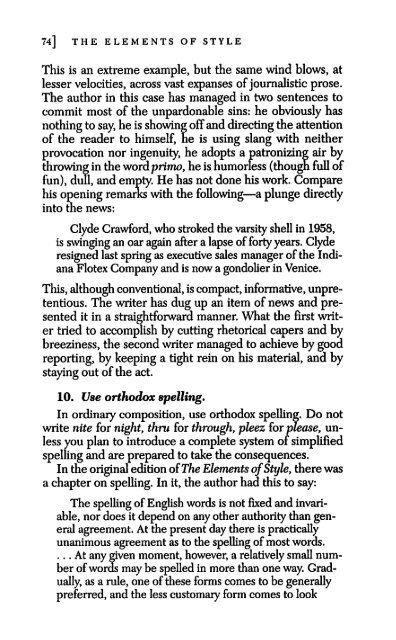You also want an ePaper? Increase the reach of your titles
YUMPU automatically turns print PDFs into web optimized ePapers that Google loves.
74] THE ELEMENTS OF STYLE<br />
This is an extreme example, but the same wind blows, at<br />
lesser velocities, across vast expanses of journalistic prose.<br />
<strong>The</strong> author in this case has managed in two sentences to<br />
commit most of the unpardonable sins: he obviously has<br />
nothing to say, he is showing off and directing the attention<br />
of the reader to himself, he is using slang with neither<br />
provocation nor ingenuity, he adopts a patronizing air by<br />
throwing in the word primo, he is humorless (though full of<br />
fun), dull, and empty. He has not done his work. Compare<br />
his opening remarks with the following—a plunge direcdy<br />
into the news:<br />
Clyde Crawford, who stroked the varsity shell in 1958,<br />
is swinging an oar again after a lapse of forty years. Clyde<br />
resigned last spring as executive sales manager of the Indi<br />
ana Flotex Company and is now a gondolier in Venice.<br />
This, although conventional, is compact, informative, unpre<br />
tentious. <strong>The</strong> writer has dug up an item of news and pre<br />
sented it in a straightforward manner. What the first writ<br />
er tried to accomplish by cutting rhetorical capers and by<br />
breeziness, the second writer managed to achieve by good<br />
reporting, by keeping a tight rein on his material, and by<br />
staying out of the act.<br />
10. Use orthodox spelling.<br />
In ordinary composition, use orthodox spelling. Do not<br />
write nite for night, thru for through, pleez for please, un<br />
less you plan to introduce a complete system of simplified<br />
spelling and are prepared to take the consequences.<br />
In the original edition of <strong>The</strong> <strong>Elements</strong> of <strong>Style</strong>, there was<br />
a chapter on spelling. In it, the author had this to say:<br />
<strong>The</strong> spelling of English words is not fixed and invari<br />
able, nor does it depend on any other authority than gen<br />
eral agreement. At the present day there is practically<br />
unanimous agreement as to the spelling of most words.<br />
... At any given moment, however, a relatively small num<br />
ber of words may be spelled in more than one way. Grad<br />
ually, as a rule, one of these forms comes to be generally<br />
preferred, and the less customary form comes to look


